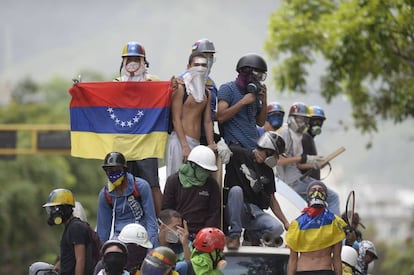Two dead in Venezuela as protests spread to government stronghold
Rioting and looting in Barinas, birthplace of Hugo Chávez, after clashes with security forces
The epicenter of the street protests that have swept Venezuela for the last 51 days has moved to the southwest of the country and the state of Barinas. It’s a place with symbolic importance to the ruling United Socialist Party (PSUV), as that is where its founder, former president Hugo Chávez, was born and grew up. On Monday, two people were shot dead there, sparking rioting that caused extensive damage to property, including the house where Chávez lived as a boy.

The MUD opposition alliance organized a march of health professionals on Monday in the capital, Caracas, and other cities to highlight chronic shortages of basic medicines and hospital supplies. This coincided with a call for a general strike on social networks that was not backed by any opposition parties.
In Barinas, large numbers of people heeded the strike call, either voluntarily or due to pressure from opposition supporters, who patrolled the streets of the capital of the same name, setting up barricades on main roads.
Witnesses said that snipers dressed in civilian clothing fired on protesters from a building owned by the state oil company PDVSA
Violence erupted as news spread of the death of two young men in clashes with security forces in the city, with groups pelting the Chávez family home with stones. Government-run institutions were also attacked, while shops on the main avenue of the city were looted.
Barinas, which is governed by Chávez’s elder brother Adán, has long been a stronghold of the ruling party. But in recent years, opposition leaders such as Héctor Capriles, who ran for president in 2012, have made inroads there.
In Caracas, there was tension in the middle-class districts of Baruta and El Hatillo, where groups of protesters faced off against security forces. Residents, who overwhelmingly support the opposition, used social networks to report the presence of groups of so-called colectivos, groups of armed civilians who work with the police and army to intimidate protesters.
Witnesses said that snipers dressed in civilian clothing fired on protesters from a building owned by the state oil company PDVSA in the industrial area of La Trinidad. At least one person was reported wounded.

Meanwhile, participants in Monday’s opposition march were prevented from entering the center of Caracas, with riot police firing tear gas into the crowd.
During the march, Capriles, who is governor of the state of Miranda, which surrounds the capital, issued a statement saying that the protests had triggered Article 350 of the Venezuelan Constitution, which permits the populace to “disown” any government that violates democratic values or encroaches on human rights.
Venezuelans have the right to disobey any fraudulent announcement Opposition leader Héctor Capriles
“Venezuelans have the right to disobey any fraudulent announcement,” said Capriles in reference to President Nicolás Maduro’s convening of a National Constituent Assembly, which would sideline the existing National Assembly, controlled by the opposition, and be responsible for writing a new Constitution.
The government, which has blamed the opposition for most of the dozens of deaths over the last 51 days, called a “Grand March for Peace, Life, and Co-existence” on Tuesday in Caracas.
Speaking at a press conference on Monday, Ernesto Villegas, the minister for communication and information, said that of the 1,600 opposition protests the government says have taken place since April 1, 600 have been violent. He accused the opposition of trying to blame the government for the deaths, “using the pain of families to spread a truth that cannot be reversed.”
English version by Nick Lyne.
Tu suscripción se está usando en otro dispositivo
¿Quieres añadir otro usuario a tu suscripción?
Si continúas leyendo en este dispositivo, no se podrá leer en el otro.
FlechaTu suscripción se está usando en otro dispositivo y solo puedes acceder a EL PAÍS desde un dispositivo a la vez.
Si quieres compartir tu cuenta, cambia tu suscripción a la modalidad Premium, así podrás añadir otro usuario. Cada uno accederá con su propia cuenta de email, lo que os permitirá personalizar vuestra experiencia en EL PAÍS.
¿Tienes una suscripción de empresa? Accede aquí para contratar más cuentas.
En el caso de no saber quién está usando tu cuenta, te recomendamos cambiar tu contraseña aquí.
Si decides continuar compartiendo tu cuenta, este mensaje se mostrará en tu dispositivo y en el de la otra persona que está usando tu cuenta de forma indefinida, afectando a tu experiencia de lectura. Puedes consultar aquí los términos y condiciones de la suscripción digital.








































